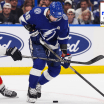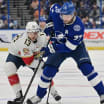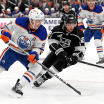Special teams play such an important role in the playoffs, and the Blues and Bruins have been shorthanded for the least amount of time per game in the postseason. The Blues, shorthanded for 6:18 per game in the postseason, were a relatively disciplined team during the regular season, ranking eighth in the NHL with an average of 7:35 shorthanded time on ice per game.
On the other hand, the Bruins, who rank second in the playoffs with 6:21 of shorthanded ice time per game, ranked 30th during the regular season with an average of 9:43. The Bruins' newfound discipline has certainly helped them reach the Final.
Boston's power play tops the NHL in the postseason, scoring on 34 percent of its opportunities with 17 goals in 17 games. That is even better than it performed in the regular season, when the Bruins ranked third with a 25.9 percent efficiency on the power play. St. Louis' power play in the postseason ranks ninth, at 19.4 percent, which is only slightly behind their regular-season efficiency of 21.1 percent, which ranked 10th.
With Rask in goal, the Bruins have been effective penalty killers, too, ranking third with 86.3 percent efficiency. The Blues have not been as successful shorthanded, ranking 11th in the playoffs with 76.0 percent penalty-killing efficiency. They were more effective in the regular season, killing 81.85 percent.
If the Blues can neutralize Boston's apparent advantage on special teams, that would level the playing field because both teams have been relatively strong at 5-on-5.
Through three rounds, the Bruins have a collective
SAT percentage
of 51.19, fractionally ahead of the Blues, at 51.06. That is virtually a statistical standoff.
During 5-on-5 play, the Blues have scored 2.16 goals per game, the best rate in the playoffs, while allowing 1.63
5-on-5 goals per game
.
That's a 0.53 goals-per-game advantage for the Blues at 5-on-5.
Boston has scored 1.88 goals per game but has allowed just 1.35 5-on-5 goals per game, which also leaves the Bruins with a 0.53 goals-per-game advantage at 5-on-5.


















